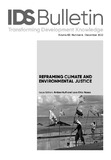Policing Environmental Injustice
| dc.contributor.author | Brock, Andrea | |
| dc.contributor.author | Stephens Griffin, Nathan | |
| dc.coverage.spatial | United Kingdom | en |
| dc.date.accessioned | 2022-12-05T15:36:42Z | |
| dc.date.available | 2022-12-05T15:36:42Z | |
| dc.date.issued | 2022-12-12 | |
| dc.identifier.citation | Brock, A. and Stephens-Griffin, N. (2022) 'Policing Environmental Injustice', IDS Bulletin 53.4: 65–99, DOI: 10.19088/1968-2022.139 | en |
| dc.identifier.issn | 1759-5436 | |
| dc.identifier.uri | https://opendocs.ids.ac.uk/opendocs/handle/20.500.12413/17772 | |
| dc.description.abstract | Environmental justice (EJ) activists have long worked with abolitionists in their communities, critiquing the ways policing, prisons, and pollution are entangled and racially constituted. Yet, much EJ scholarship reflects a liberal Western focus on a more equal distribution of harms, rather than challenging the underlying systems of exploitation these harms rest upon. This article argues that policing facilitates environmentally unjust developments that are inherently harmful to nature and society. Policing helps enforce a social order rooted in the ‘securing’ of property, hierarchy, and human-nature exploitation. Examining the colonial continuities of policing, we argue that EJ must challenge the assumed necessity of policing, overcome the mythology of the state as ‘arbiter of justice’, and work to create social conditions in which policing is unnecessary. This will help open space to question other related harmful hegemonic principles. Policing drives environmental injustice, so EJ must embrace abolition. | en |
| dc.description.sponsorship | IDS Strategic Research Initiative on Climate and Environmental Justice | en |
| dc.language.iso | en | en |
| dc.publisher | Institute of Development Studies | en |
| dc.relation.ispartofseries | IDS Bulletin;53.4 | |
| dc.rights | This is an Open Access journal distributed under the terms of the Creative Commons Attribution Non Commercial 4.0 International licence (CC BY-NC), which permits use, distribution and reproduction in any medium, provided the original authors and source are credited, any modifications or adaptations are indicated, and the work is not used for commercial purposes. http://creativecommons.org/licenses/by-nc/4.0/legalcode | en |
| dc.rights.uri | http://creativecommons.org/licenses/by-nc/4.0/ | en |
| dc.subject | Climate Change | en |
| dc.subject | Environment | en |
| dc.subject | Governance | en |
| dc.subject | Security and Conflict | en |
| dc.title | Policing Environmental Injustice | en |
| dc.type | Article | en |
| dc.rights.holder | Institute of Development Studies | en |
| dc.identifier.team | Resource Politics | en |
| dc.identifier.doi | 10.19088/1968-2022.139 | |
| dcterms.dateAccepted | 2022-12-12 | |
| rioxxterms.funder | Default funder | en |
| rioxxterms.version | VoR | en |
| rioxxterms.versionofrecord | 10.19088/1968-2022.139 | en |
Files in this item
This item appears in the following Collection(s)
Except where otherwise noted, this item's license is described as This is an Open Access journal distributed under the terms of the Creative Commons Attribution Non Commercial 4.0 International licence (CC BY-NC), which permits use, distribution and reproduction in any medium, provided the original authors and source are credited, any modifications or adaptations are indicated, and the work is not used for commercial purposes. http://creativecommons.org/licenses/by-nc/4.0/legalcode


